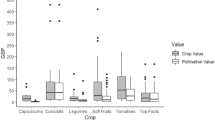Abstract
The argument in this essay is twofold. (1) Procedural justice requires,in particular cases, that we restrict property rights in natural resources, e.g., California agricultural land or Appalachian coal land. (2) Conditions imposed by Locke's political theory and by dense population require,in general, that we restrict property rights in finite or non-renewable natural resources such as land. If these arguments are correct, then we have a moral imperative to use land-use controls (such as taxation, planning, zoning, and acreage limitations) to restructure land ownership and land use in a far more radical way than has ever been accomplished in the past.
Similar content being viewed by others
Author information
Authors and Affiliations
Rights and permissions
About this article
Cite this article
Shrader-Frechette, K.S. Agriculture, ethics, and restrictions on property rights. Journal of Agricultural Ethics 1, 21–40 (1988). https://doi.org/10.1007/BF02014460
Issue Date:
DOI: https://doi.org/10.1007/BF02014460




